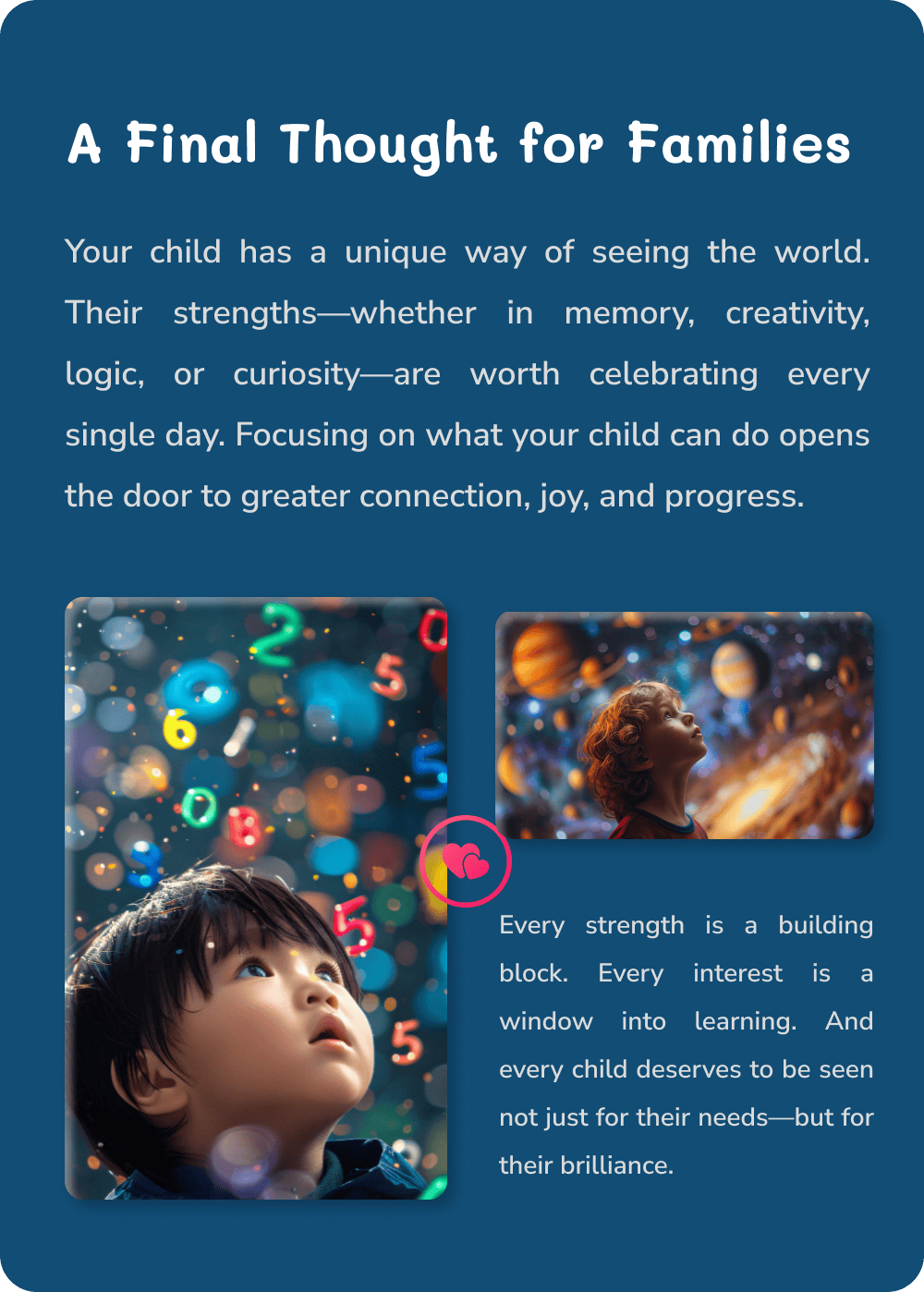Discovering Strengths in Children with Autism
A strengths-based look at autism—exploring the unique abilities and how to nurture them in daily life.
Speech Therapy

When we think about supporting children on the autism spectrum, the conversation often centers on challenges. But what if we started from a place of strength? What if we looked first at what makes a child shine?
One of the most powerful questions we can ask as professionals or caregivers is:“What are your child’s strengths?”
This question often takes parents by surprise—but in the best way. Responses are heartfelt, insightful, and deeply personal. Many parents share that their child is “very smart,” “has a great memory,” or “figures things out on their own.” What they may not realize is that these strengths are commonly observed in autistic children.
In this blog, we’ll explore the unique strengths often seen in children on the autism spectrum, why it’s important to recognize them, and how you can nurture these abilities in everyday life.
Common Strengths in Autistic Children
Autistic children often exhibit exceptional abilities in specific areas. While every child is unique, here are some strengths that show up again and again:
01 Excellent Memory
Many children on the spectrum have an extraordinary ability to recall information—whether it’s events, facts, names, or routines. Their memory can be a valuable asset in both academic and real-life settings.
02 Early Reading or Hyperlexia
Some children develop the ability to recognize letters, numbers, or even words at a very early age. This precocious reading ability is known as hyperlexia and often coexists with a love of books or signs.
03 Strong Attention to Detail
Children may be drawn to the way things work, focusing intensely on mechanisms, patterns, or structures. This can lead to a deep understanding of topics that interest them.
04 Love for Facts and Information
Autistic children often absorb a large amount of information about their favorite subjects. Whether it’s dinosaurs, maps, the solar system, or public transportation—they become walking encyclopedias!
05 Analytical and Logical Thinking
Many children excel in recognizing patterns, solving puzzles, or approaching problems from a fresh angle. Their logic can be impressive, even at a young age.
06 Neatness and Organization
Some children enjoy organizing toys, lining up objects, or arranging items by color, size, or type. This attention to structure often reflects their internal sense of order.
07 Technology Fluency
Children on the autism spectrum are often quick learners when it comes to technology. They may navigate apps, games, or devices with ease and confidence.
08 Creative Independence
From finding new ways to open a cabinet to figuring out how to operate a device, their problem-solving often shows up in creative, independent ways.
Why Focus onstrength
When we focus only on what a child is struggling with, we miss an opportunity to truly understand who they are. Highlighting strengths allows us to:

Build confidence and self-worth

Foster motivation and engagement

Result-driven learning

Develop social-emotional skills
Starting with strengths doesn't mean ignoring challenges—it means balancing the picture. A child’s strengths are often the key to helping them overcome obstacles.
How Parents Can Support Their Child’s Strengths
You don’t need special materials or training to nurture your child’s strengths. Here are a few simple strategies:
01 Observe What They Love
Pay attention to what excites your child. Do they love numbers? Do they line up their toys? Are they fascinated by shapes or signs? These interests offer clues to their natural talents.
02 Use Strengths as a Gateway
Incorporate what they love into daily routines. If they enjoy letters, use alphabet games to build communication. If they like patterns, try sorting and sequencing activities during play.
03 Celebrate Small Wins
Even a small step, like saying a new word or completing a puzzle, is a big achievement. Recognize these wins often—they build confidence.
04 Create an Encouraging Environment
Give your child opportunities to explore and express their skills. Praise their efforts and show interest in what they’re passionate about.


Check Out More Articles

Child Development
W-Sitting: What you Need to Know
Better Posture, Stronger Movement- Help Your Child Sit right !

Therapies
Breaking the silence
Early Support, Lifelong Confidence- Empowering Children to Communicate with Clarity!

ABA Therapy
Fostering Eye Contact Naturally
Increasing eye contact with your child is a great way to build connection, trust, and communication.





